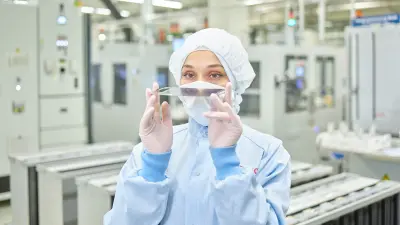Fuel cells as a flexible and modular energy source for data centers

Reliable power supply for data centers thanks to SOFC
With the evolution of smart factories, autonomous driving, streaming and other modern technologies, data-based applications are becoming more numerous and more diverse. Demands on computing performance and transmission speed are rising, too, as a result. Core and edge data centers are both reliant on failsafe, uninterruptible power supplies. However, existing energy grids are increasingly being pushed to their limits and beyond, and are either no longer able to meet the growing energy demands of the data center sector, or cannot meet them to a satisfactory standard. A gap is opening up between the amount of energy that can be supplied and the energy required. Decentralized energy generation could therefore provide a solution. Electricity produced locally and on site provides a reliable, high-quality supply on the one hand, while also helping to make the grid more stable on the other. Generated using renewable energies such as green hydrogen, this electricity also has a positive role to play in climate protection and will be able to meet the requirements of any future legislation and private-sector ambitions regarding climate neutrality.
SOFC systems as a solution for edge data centers
Edge data centers are data centers located at the edge of a network that process and supply data. Processing the data in direct proximity to the end devices ensures shorter latencies and high bandwidths, which is particularly important for applications such as autonomous driving.
The prefabricated Bosch SOFC systems feature a modular design concept and can therefore support a diverse range of applications in edge data centers. Several SOFC units and all relevant auxiliary systems such as a heat exchanger, desulfurization unit, edge controller, and grid modules are combined to create a plug-&-play system with an output of 100 kW. Depending on requirements and the energy demand in a data center, it will be possible to use several of these systems together in the future to create a decentralized power supply system in the megawatt range and connect it to data center-specific components. As a result, the power supply can grow flexibly in tandem with the IT infrastructure, thereby tying up only as much capital as is strictly necessary.
SOFC systems as a solution for core data centers
Core data centers are large-scale data centers that are frequently located in or around major cities such as London or Dublin. They are generally spread across several buildings, with a power rating of 10 to 15 megawatts per unit. Customized SOFC systems will also be available for core data centers, whether they are co-location, enterprise, or cloud data centers. The growth of server, storage, and network infrastructures requires the surrounding operational infrastructure to grow, too. SOFC systems can be moved between different locations and scaled, meaning they can be adapted to the existing IT infrastructure according to requirements. The advantage is that users only have to install what they actually need. This saves resources, while also minimizing the amount of capital tied up.
How are SOFC systems used in data centers?
Currently, most data centers draw their primary energy from the power grid. If there is a power failure, backup systems often temporarily take over the power generation. However, the level of electrical efficiency is low, while maintenance outlay and harmful emissions are high. What’s more, power grids are increasingly struggling because they have not been designed to cope with the ever-rising energy demands.
SOFC systems not only eliminate the need for backup systems such as diesel generators, they actually represent a resilient alternative to conventional power grids, because they can supply primary energy to data centers. Electrical losses through substations and transformers become a thing of the past. The increased flexibility is an added bonus. Data centers can be set up quickly and economically – all with needs-based scaling options. Their location can also be changed. They can be used in anything from the 100 kW solution up to an SOFC system in the megawatt range.
Step 1: Basic power supply with SOFC systems
SOFC systems supply primary energy to the data center. In addition, the conventional supply grid levels out load peaks. The diesel generators are kept as backup systems for the time being.
Step 2: Backup becomes superfluous to requirements
Adding more SOFC systems makes it possible for the fuel cells to cover any potential peak loads in the data center. Should there be any outages, the conventional power grid acts as a backup. Diesel generators are no longer required.
Step 3: Complete SOFC operation
With a certain number of SOFC systems, there is no longer a need for any kind of backup system. The data centers can now be operated completely independently of the power grid. They finally have their own on-site power supply they can rely on.

We are members of the German Datacenter Association (GDA), which promotes the interests of data centers in the political world, wider society and the media.
Contact

Would you like to use the Bosch SOFC system in your data center?
The Bosch SOFC system is currently in the pilot phase. All technical specifications given are development objectives and refer to the beginning of life.



















